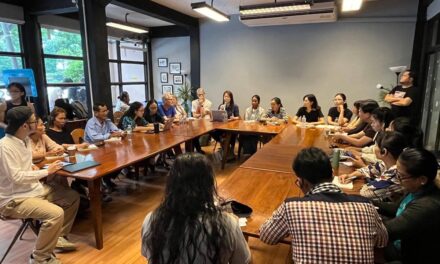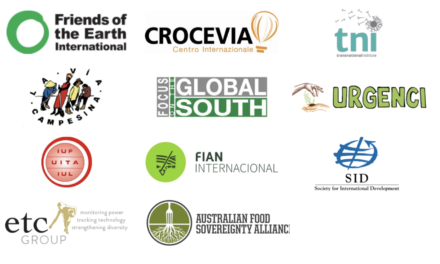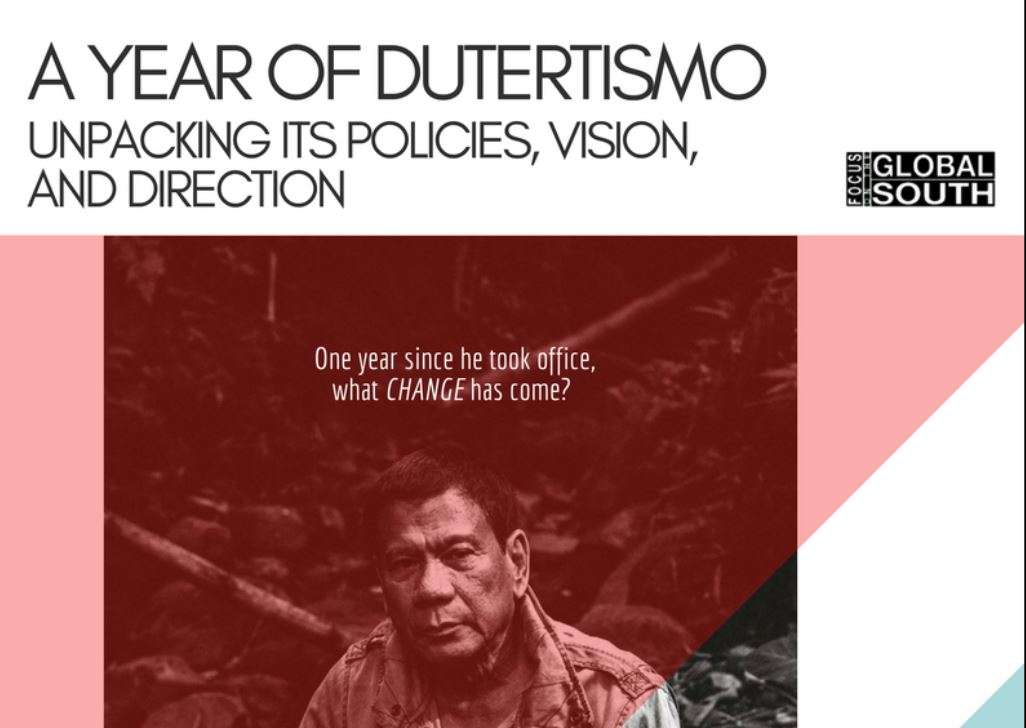An Account of the Civil Society Launch of the “IMF – Shrink It or Sink It” campaign at the IMF/World Bank meetings – Singapore – September 17, 2006
By Soren Ambrose – Solidarity Africa Network (Nairobi, Kenya)
In normal times, an account of a seminar can easily be a self-contained thing – one that begins with a listing of the organizers and ends with the closing remarks. But an account of “Breaking Free: Conference on Alternatives to the International Monetary Fund” held in Singapore on September 17th, during the annual meetings of the international financial institutions (IFIs) – the World Bank and International Monetary Fund – cannot be separated from its context. And that context requires a bit of exposition….
The Context
When some 40 activists met in Washington in April 2006 and agreed to launch a campaign on the IMF (“Shrink It or Sink It”), one of the concrete activities they agreed on was sponsoring seminars as part of the civil society events at the IFI meetings in Singapore in September.
As plans for those meetings became firmer, the main civil society events were scheduled for Batam, Indonesia, an island-city across the channel from Singapore, in order to avoid conflicts with the repressive Singapore government. The event was to be called the International People’s Forum vs. the World Bank & IMF (IPF). E-mail discussions on the “imf-campaign” listserv set up after the April meeting resulted in an agreement to hold two sessions, one in Batam and one in Singapore. The Singapore event was intended to make clear that civil society forces would not cede the space entirely to the IFIs, and indeed would launch a campaign to disempower or eliminate the IMF in full view of the press corps covering the annual meetings. It was also designated as a part of the International People’s Forum – its outpost in Singapore, if you like.
Focus on the Global South took the lead in organizing the Singapore event, called “Breaking Free: Conference on Alternatives to the IMF.” The 50 Years Is Enough Network, La Via Campesina, Gender Action and Jubilee South joined as co-sponsors. The session was designed as a one-day forum on Sunday, September 17, to be held at one of the hotels hosting delegates to the annual meetings. The emphases would be on civil society’s complete rejection of the IMF, even as the institution gropes for a “new role,” and on the presentation of alternative and just ways to manage the global economy.
We could not have anticipated the extent of the repression and paranoia the Singapore government would exhibit. Several members of the Focus staff were informed by IFI personnel in the week before the meetings that they would not be allowed by the Singapore government to attend the official meetings, and would perhaps be barred from entering the country altogether. By the time people began arriving for the IPF and the official meetings, it was announced that a “blacklist” of 27 accredited activist-delegates to the IFI meetings had been drawn up by the Singapore authorities, and it soon became clear that in fact Singapore was banning, detaining, and/or deporting a much wider range of civil society figures. The IFIs let Focus know that its entire staff would not be allowed to enter Singapore.
While this was certainly a blow to our efforts, the organizers decided not to allow it to derail the event entirely. Several people who were scheduled to speak at the forum or who work for co-sponsors or other allied organizations were allowed into Singapore, and were enlisted to help with the effort. Alejandro Bendaña of Jubilee South & Centro de Estudios Internacionales (Nicaragua), one of the scheduled speakers, assumed a central role, and secured assistance from staff of the Bretton Woods Project (U.K.), Eurodad (Belgium) and others.
It was also decided that the actions of the Singapore government had sufficiently altered the context in which our event was occurring, and that we needed to re-design the event in response. With several of the scheduled speakers unable to enter Singapore, and with others having changed their plans upon hearing of the government’s actions, and with the boycott of civil society events held within the IFI meetings, our event assumed a new importance as an outpost of “free speech” in Singapore. Accordingly we decided to transform the first panel into a press conference that would address the Singapore government’s actions and the IFIs’ complicity in them.
On the evening of September 15, after enormous pressure from civil society and the heads of the IFIs, the Singapore government announced that it would allow 22 of the 27 people on its quasi-official blacklist to enter the country. We were informed that while some staff of Focus would be allowed entry, two of the key organizers of the event, Walden Bello and Shalmali Guttal, were among the five individuals whose banning had not been rescinded (they would be “subject to interview” if they tried to enter according to the official statement).
After considerable discussion among the “officially-banned” activists and their allies in Batam on the evening of the 15th and morning of the 16th, it was decided that two of those whose bannings had been overturned would go to Singapore in order to speak at the press conference we had put in place for the morning of the 17th. Although we had held press conferences in Batam to announce the civil society boycott of the official IFI events (on the 15th) and to react to the news of the partial “unbanning” (on the 16th), we anticipated that journalists who had not traveled to Batam would be interested in talking with some of those who had been banned.
All the while, we were wrestling with how to promote the event. It seemed reasonable to assume that the more public our advertising of the event, the more likely it was that the Singapore authorities would find a reason to shut the event down. But we also wanted people, especially press, to attend. We ended up trying to balance these two contradicting impulses. It is likely that press attendance would have been greater if we could have publicized the event further in advance and more broadly. As it was, Alejandro received a phone call the night before the event, after 10 pm, from the Singapore police, who informed him that the event “might require a license.” By that time, a contingent consisting of the two “unbanned” people (Joy Chavez of Focus and Antonio Tricarico of Campagna per la Riforma della Banca Mondiale, accompanied by Sameer Dossani of the 50 Years Is Enough Network and myself, had traveled from Batam to Singapore and joined Alejandro. After extensive discussion and informal consultation with Singaporean lawyers, Sameer and I accompanied Alejandro to the police station at 1 am. Sameer has written a fuller account of that excursion available at www.50years.org; for the purposes of this account, I will just report that the license was issued in apparent record time – what we were told usually takes 21 days was accomplished in less than an hour.
Finally: the Event Itself
We were pleased to find no obvious government agents present at the hotel on Sunday morning. We were allowed to conduct our event without restrictions.
With about 50 people in attendance – not including as many as 40 journalists – the press conference got underway. Sameer moderated while Joy and Antonio spoke eloquently about their respective experiences of and reflections on being banned, and then unbanned, from entering Singapore and participating in any events at the IFI meetings. Joy read a joint statement which the “banned” had presented at the previous day’s Batam press conference. They also reiterated the principles and conclusions contained in the statement by the over 160 civil society organizations boycotting the official IFI events.
Their statements and the question-and-answer period lasted about 40 minutes. Afterwards both Joy and Antonio conducted a number of interviews with journalists in the lobby outside the meeting room. Joy became a temporary fixture on Singapore television and on the regional Singapore based news station Channel News Asia as a result.
The second panel was designed as a continuation of the press conference, but now focusing specifically on the IMF. Sameer and Alejandro spoke on the panel, along with Peter Hardstaff of World Development Movement (U.K.). Our gratitude goes to Olivia MacDonald of Christian Aid (U.K.) who was corralled at the last moment to act as moderator.
Peter talked about the meeting of the International Monetary and Financial Committee (IMFC), the effective policy-making body of the IMF, which was going on at that moment. Focusing on the much-publicized proposal to re-align some of the voting percentages on the IMF board, awarding slightly higher percentages to four countries (Mexico, Turkey, China, South Korea), Peter derided the reform as both a sign of the universal recognition of the IMF’s crisis of legitimacy and as a completely insufficient response. After years of monitoring and campaigning on the IFIs, Peter said, the World Development Movement had just adopted a position calling for their dismantling.
Sameer talked about the process by which we had announced the launching of the IMF: Shrink It or Sink It campaign. The official launching happened the previous day at the IPF in Batam. A statement by the same title and with more than 160 organizations already signed on was circulated at the conference. The campaign is designed to capitalize on the IMF’s crisis of legitimacy to dis-empower (as opposed to the re-empowering suggested by some Northern governments) of the IMF. If successful, this would mean genuine economic democracy could be a possibility in many countries for the first time.
Alejandro spoke about the IMF’s record of devastation achieved through the manipulation of debt claims and loan conditions throughout the Global South over the last 25 years. Like Peter, Alejandro expressed a conviction that the IMF cannot be reformed away from its essential identity as a tool of the G8 governments and the neo-liberal economic paradigm favored by multinational corporations and investors.
Several of the journalists present, especially those from Singapore, demonstrated both great interest in the critiques and positions offered, and regret that there were few fora in Singapore at which to have such discussions.
After a tea break, the organizers improvised a discussion with an emphasis on broad participation and alternatives to the IMF. It was kicked off by Oscar Ugarteche, a Peruvian economist and professor at the Autonomous National University of Mexico (UNAM) who has recently completed a book considering the history of the global financial system in the 20th and 21st centuries and proposals for its transformation. He spoke about the manifest flaws in the IMF as it has evolved, and put forward suggestions for change. He outlined how more democratic versions of regional development banks and the development of regional monetary funds could result in a global economy with more latitude for a greater range of economic policy options, on both the regional and national levels, and with greater capacity to protect and advance the interests of those who have thus far been marginalized in global governance.
Oscar’s presentation sparked a surprisingly lively discussion, which managed to draw on the perspectives and experiences of people from several different backgrounds, including other economists and people who have witnessed the evolution of the unique Singapore economy.
After this discussion, we broke for lunch – a rather lavish affair, planned for 150. The 30-40 people who dined ate well.
The final session of the day took advantage of the arrival of a contingent from Suntec Center, where the official meetings were going on. Jomo K.S., a Malaysian economist, reported in detail on his first experience attending an IMFC meeting, as a representative of the United Nations Department of Economic and Social Affairs (UNDESA).
Jomo gave a blow-by-blow account of the discussion over the quota re-alignment which Peter had described during the day’s second panel. We learned that while, as widely expected, India and Brazil were objecting to the quota distribution, Southeast Asians were generally more sceptical and suspicious of the IMF’s overall role.
Jomo also reported on the on the widespread concern with the failure of macroeconomic coordination to deal with the global imbalances as well as the possibility of the end of the US housing market boom spinning out of control.
Brown, at the press conference later that day, highlighted the importance of reviving the “Doha round” of talks at the World Trade Organization. Brown seemed impressed by the report of WTO Director-General Pascal Lamy, who insisted that much progress had actually been made in the course of efforts to revive the talks. Lamy’s presentation could be seen as a coded plea to Northern governments – particularly the EU and US, who are seen as the obstacles to progress in the talks – to recognize that they will never get a better deal in terms of concessions from South countries, particularly on NAMA, and so should resolve their differences and lock in the gains made thus far in the talks.
Relatively frank discussions of the costs of trade liberalization to Southern economies had taken place, while IMF research increasingly acknowledges difficulties in demonstrating the benefits of financial liberalization (though it tries to insist on positive “secondary” impacts).
After Jomo left to return to the meeting at Suntec Center, our discussion continued. Roberto Bissio of Instituto del Tercer Mundo (Uruguay), who had been the subject of much press attention for leading a walkout of the “town hall meeting” hosted by the heads of the IFIs on the 15th, joined us and shared impressions from inside the meeting venue. He commented that we should insist that the IFIs, which had been trumpeting these meetings as having the highest registration ever for civil society representatives, report on how many of those registered actually attended any sessions. The boycott meant, he said, that IFI representatives outnumbered civil society participants at most official sessions.
The discussion evolved into a debate on the impact that the Singapore meetings and the unprecedented broad civil society boycott would have on future IFI campaigning. While Alejandro advocated that the boycott be maintained on future engagements with the IFIs, Roberto demurred and pointed to circumstances which require advocates to talk with IFI officials. The debate on this tactic was continued the following day in a strategy session in Batam.
We also discussed campaigning strategies more generally, and what sorts of demands our groups should be making. Martin Khor, head of Third World Network Malaysia, who had arrived with Roberto, offered an eloquent description of strategies that recognized the importance of focusing on national governments and parliamentarians, largely dispensing with policy-level discussions with the IFIs. He also said that when discussions of board voting come up, we should demand nothing less than a one-country one-vote standard. Other active participants in the discussion included Sameer, Oscar, Marta Garrich of Ubuntu (Barcelona), and Filomeno Sta. Ana, Philippine economist with Action for Economic Reforms, and himself the subject of lengthy detention and interrogation when he entered Singapore. Overall the vision of future campaigning was one of taking advantage of the IMF’s current vulnerabilities and preventing it from “re-inventing” itself, and of ratcheting up demands, largely through pressure on national governments in both the South and the North.
At the end of the session, the participants, many of them from Southeast Asia (including several Singaporeans), insisted on taking group pictures with the “IMF – Shrink It or Sink It” banner which Focus had produced for the session. From the less-informed audience members to journalists and veteran campaigners, the tone was surprisingly uniform: the time to end the IMF’s reign has come.









